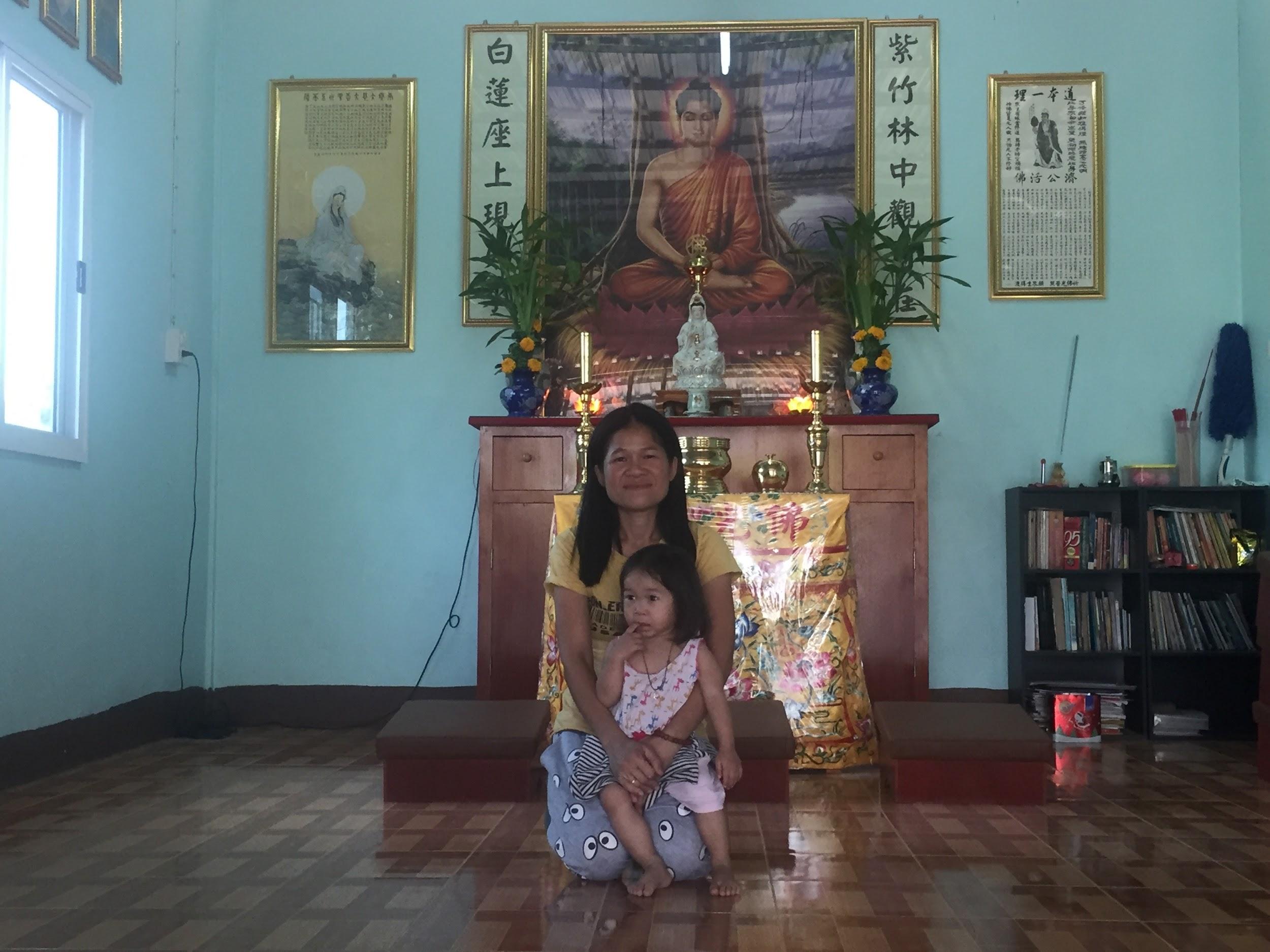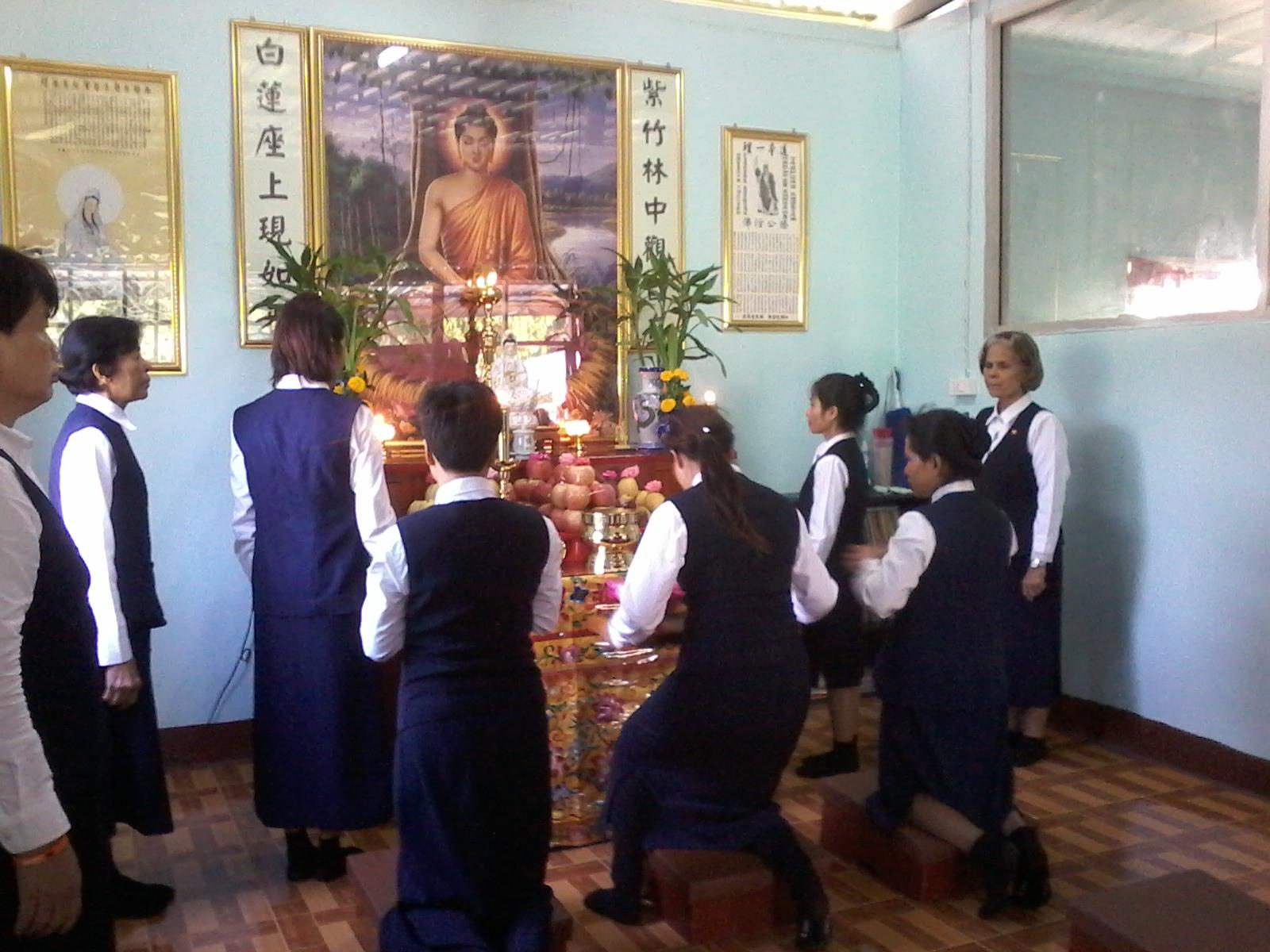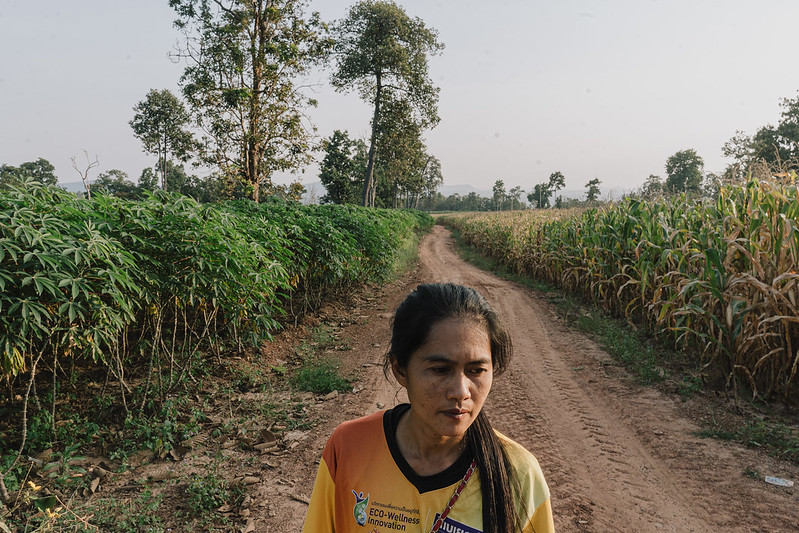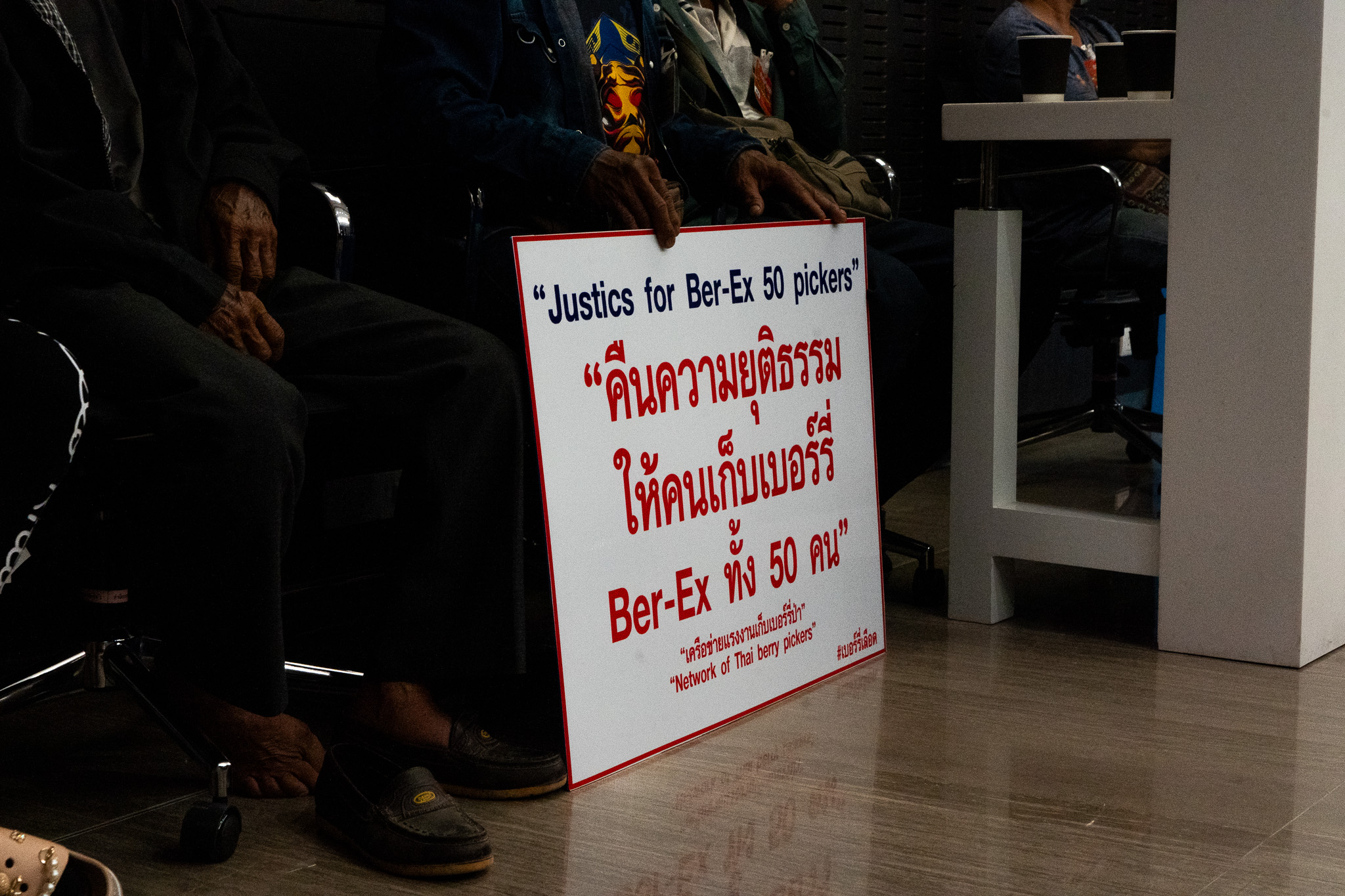Illegal and suppressed in China for decades, a system of beliefs makes its way to rural Thailand. There, a woman embraces her identity as a member of a misunderstood religious following. Holding two conflicting worlds together, she and her family are challenging centuries of cultural tradition along the way.
Guest contribution by Abbey Marino
Walking into the back corner of this family home, one is struck by the sea-foam green walls covered with religious symbolism, figures, and texts that all stand in contrast with the colors and decorations of a typical home in rural Thailand. A female bodhisattva figure takes the place of the expected Buddha image flanked by pictures of Chinese characters that even the homeowners cannot read.
If you didn’t know better, you’d swear you were in an underground Dharma center in China. But no — you’re actually in rural Thailand.
A second glance reveals everything you’d suspect of a rural Thai home and general store. The floorplan resembles that of neighboring homes, shoes are removed and piled in front of the doorstep before entry, and shelves are overflowing with haphazardly stacked bins.
But the incongruity of this home is even then not apparent; those stacked bins are loaded with ingredients for vegetarian cooking in a region known for meat-rich cuisine.
Less than five percent of the world’s population is vegetarian. The percentage is even lower when applied to Thailand. In Thapho village of Namphong District in Khon Kaen Province, the percent of vegetarians is no doubt a fraction of a fraction.
Access to proper vegetarian nourishment in rural Isaan is a challenge. Most dishes contain meat or fish as the main protein source. Beyond that, both fermented fish and fish sauce are ingredients of many dishes and are also permanent residents of the many woks and bowls used to prepare meals.
But this did not keep Tuanjai Wannada, a 37-year-old resident of the village, and her family from banishing all meat and fish products from their diet. “Are there any animals that run to us begging us to kill them? There aren’t any. It’s us who chase after them to kill them,” Tuanjai explains.
Eight years ago, Tuanjai’s life took an unexpected turn. She started practicing the dharma. This practice did not affect her religious identification as a Buddhist, but it changed others’ perception of her faith.
The Encyclopedia of Contemporary Chinese Culture calls her newfound way of life a “sectarian religion.” Others have dubbed this system of beliefs and practices “Yiguandao.” In Thailand, this faith is called anuttaratham. There are more than 7,000 shrines and thousands of believers in the country.

Tuanjai kneels in front of their family’s shrine for Guan Yin (Guan-Im), a female bodhisattva, with her two-year-old daughter, Hui Mei. The young girl is already displaying characteristics of a Yiguandao follower: when offered meat, she pushes it away.
For Tuanjai, it all started in 2009 when her sister and brother-in-law returned from time as migrant workers in Taiwan. Her sister worked five years in a restaurant and as a maid in various households; her brother-in-law spent twenty years working in a steel factory.
Yiguandao was spread amongst the employees of this factory. Tuanjai’s relatives returned to Thailand as newly-converted vegetarians, part of this religious sect’s expansion.
In contrast to Thai Theravada Buddhism, Yiguandao followers are required to uphold Buddhism’s first precept, “Thou shalt not kill,” and must eat a strictly vegetarian diet.
The belief system was born in China in the 1920s. Followers believed their leader to be a reincarnation of the Living Buddha Jigong who came back to earth to restore favor and “save” humans. Those saved are guaranteed salvation in the coming apocalypse.
Attracting attention for violent acts, the Chinese government exiled Yiguandao’s following and imposed a ban which drove its practice underground.
Banished from China, Yiguandao made its way to Taiwan. By the late 1980s, it had established a formal organization in Taipei.
Since then, migrant work has been an important economic option within Thailand’s rural communities. Working in Taiwan is especially popular, given the country’s aging demographic and plethora of available industrial positions. Within Taiwan, 61% of its documented migrant workers are from Northeastern Thailand; about 20% of these were from Udon Thani Province alone.
Northeasterners sometimes return from Taiwan with more than just extra income in their pockets: they come back with completely new beliefs and practices, adding a spiritual dimension to the typically economic focus of migrant work.
Curious about the new faith, Tuanjai and her husband accompanied their converted in-laws to a weekend retreat at a Dharma Center for a spiritual awakening. They were initiated into the following of this eclectic belief system that incorporates not just Buddhism, Hinduism, Taoism, and Confucianism, but even aspects of Christianity.
Tuanjai and her husband spent two days in meditation, contemplating the Buddhist precepts and their underlying meaning. In between meditative periods, videos of violent acts within slaughterhouses were shown for all to watch.
For the first time, the couple considered where the meat they so freely ingested originated from.
“[Before] we were Buddhists. We were not supposed to kill, but could we actually practice that?” Tuanjai asks. “Once I received the Dharma, I became fearful and didn’t dare take or eat another’s life.”
Since Tuanjai’s family converted, their meals center around vegetables as a substitute for meat. Occasionally, the family will eat eggs, but only if they are factory-produced and unfertilized.
They are forbidden from eating garlic or onion, as such condiments are prohibited for their strong flavor, believed to arouse passions. Tuanjai notes that such things eaten are meant to assist the body in digesting meat, a food group the family no longer consumes.
“Even if I’m on my death bed and the doctor prescribes meat to me, I won’t eat it,” says Tuanjai, who agrees with the Yiguandao conviction that abstinence from eating meat makes her immune to illness. She does not kill animals, so worldly diseases won’t bring her harm.
When Tuanjai became pregnant, others questioned if she would resume eating meat for her growing child’s health. They wondered whether her desire to remain a Yiguandao follower or giving birth to a healthy baby would be the priority. But Tuanjai placed her trust in Yiguandao and had a “small but healthy” child.
The girl’s name, Hui Mei, originates from Yiguandao and sounds nothing like a typical Thai name. Tuanjai takes pride in her daughter’s Mandarin name, as it is a clear expression of the family’s commitment to their beliefs. But the household’s familiarity with Chinese ends there: it’s a language they can neither speak nor write.
Tuanjai and her husband are equally bound to this system of beliefs and practices. Motivated to share their spiritual passion with friends and family, they converted their home into a Dharma Center.

The Wannada family recently moved to a different home in Ban Thapho. Yiguandao missionaries and followers from Taiwan came to celebrate the move, asking the spirit to accompany their relocation and bless this new home. These missionaries and followers normally visit four times a year.
They want to make it easier for the community to experiment with a vegetarian lifestyle. For this reason, the new Dharma Center also doubles as a vegetarian grocery store. It has vegetarian products near at hand, as there is only one other such store within a 40-kilometer radius.
Spreading Yiguandao beliefs and practices to fellow community members proved not to be an easy undertaking. Committing to a meatless life in a culture that does not encourage it takes a lot of dedication. The culturally ingrained, community-style eating of the Northeast has led many followers away.
Others in the village are also often suspicious of the family’s “conversion” to a belief system that seems to demean the Buddhism they know. They are confused by Tuanjai’s full involvement in the community. She still goes to the temple and participates in festivals, even though she cannot share meals with her neighbors or indulge in the food at any festivals or feasts.
Yet Tuanjai does not feel like an outsider. In her mind, there is no contradiction. She does not want to turn her back on Buddhism but incorporate her Buddhist ideals into the most intimate parts of her life.
Though many may not understand her ways, she credits Yiguandao for the many blessings in her life, including a healthy daughter, a supportive husband, and a community of faith. Her practice has made her more courageous, giving her the strength to endure.
“There was a change in me. My mind became loving and kind,” Tuanjai says about the impact of Yiguandao, which she hopes other people in her community will come to experience, too.
Abbey Marino is a sociology and economics student from the University of Tulsa. She studied public health issues in Khon Kaen from January to May this year.




